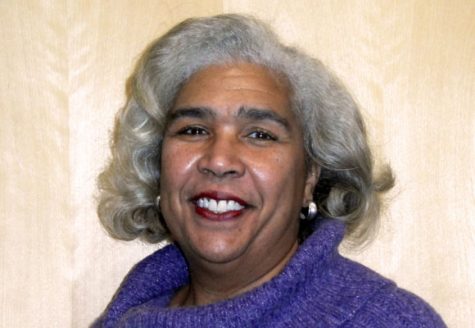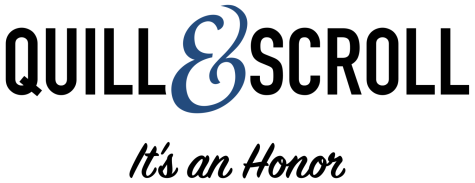THE WEEKLY SCROLL
March 6, 2020
News, tips and advice from Quill and Scroll
The Lede
AP releases a collection of stories to understand the coronavirus outbreak
With misinformation swirling from many sources surrounding the new coronavirus, AP has released a collection of reliable stories that inform readers about the progression of COVID-19 from its origins to today, including the proper reference to the virus’ name. Read the collection here.
Warren drops White House bid
Sen. Elizabeth Warren (D-Massachusetts) ended her presidential campaign this week, leaving two men in their 70s — Sen. Bernie Sanders (I-Vermont) and former Vice President Joe Biden — with the best chance of running against President Donald Trump (also in his 70s) in the 2020 general election. Barring any third-party runs and an upset of gigantic proportions in which Rep. Tulsi Gabbard (D-Hawaii) wins the Democratic nomination, the United States will have a male president through Jan. 20, 2025, a string of 236 years or since the office was first filled by George Washington.
Australian AP will join other defunct wire services
On March 2, the Australian Associated Press announced they will be shutting down their operation on June 26, 2020.
AAP was the primary newswire service in Australia and their impending closure is a blow to an already crumbling backbone of newswire services across the world who provide the media with up-to-date information on breaking news, issues and events.
AAP stood tall for 85 years, providing on-the-ground reporting and photography for both international and local news. One hundred eighty journalists will have to find new jobs, but for now they keep their head down and continue working, remaining loyal to both their publication and the public.
The Guardian, however, reports that over 50 reporters will likely be offered jobs at News Corp and Nine amid the AAP closure, both media organizations which pulled out of their subscription to the newswire service.
Have been overwhelmed by messages of support to @AAPNewswire as it closes. Now in awe of my staff who now have heads down and continuing their work. Not surprised.
— Tony Gillies (@TonyGillies) March 3, 2020
Virginia bans minor conversion therapy

Photo by Sara Rampazzo on Unsplash
Virginia has become the first Southern state and the 20th nationwide to ban conversion therapy for minors Tuesday. House Bill 386 prohibits state-licensed mental health counselors from offering any services that claim to change the sexual identity of an LGBTQ+ minor. The bill also prohibits state funding to be given toward any person or group that practices this type of conversion therapy.
“Conversion therapy sends the harmful message that there is something wrong with who you are,” said [Governor] Northam. “No one should be made to feel they are not okay the way they are — especially not a child. I’m proud to sign this ban into law.”
The newly passed bill comes just in time to compare to newly released data from the Trevor Project’s National Survey on LGBTQ Mental Health. The study reported the 2 out of 3 LGBTQ youth have had someone try to convince them to change their sexual or gender identity. In banning the practice of conversion therapy in Virginia, state lawmakers are working to fight this statistic.
Opposers of the bill include groups like Alliance Defending Freedom and Liberty Counsel. The groups claim the bill violates their own practices of freedom of speech and religious freedom; they state that teens should be able to attempt to get rid of “gender confusion” and “same-sex attraction.”
Read more about the new law here.
High school student creates fake political candidate account on Twitter; gets verified

Photo by Sara Kurfeß on Unsplash
A high school student from upstate New York created a fake Twitter profile for a 2020 candidate — that does not exist. The account received a blue check mark — meaning that the account was verified — on Twitter in February, despite the candidate having no identification or documentation to prove that the fake candidate, Andrew Walz, was registered or even a real citizen.
This comes after Twitter announced in December it would verify all credible political candidates in the 2020 race. A Georgia candidate, Jannquell Peters, struggled to become verified on Twitter despite having the proper paperwork and identification. She claimed her lack of verification hurt her campaigning process.
The teenager who created the fake Twitter account was interested in testing Twitter’s verification and misinformation handling processes. He said it took about 20 minutes in total to make the fake candidate and Twitter account. He registered the fake candidate at Ballotpedia, a site that considers itself to be an encyclopedia of political candidates. This is the resource Twitter used to verify candidates. Twitter reaches out to candidates regarding verifying the account and any qualifications that are needed to complete the process.
This simple threat of misinformation created by a high school student opens up a larger discussion regarding the information that circles by expert outside sources. The time and ability it took to verify a fake political candidate was minimal; how can Twitter stop foreign agents if it cannot stop a high school student?
Read more about this story here.
It’s An Honor
Quill and Scroll deadlines and reminders all in one place
Don’t want to read through all of our deadlines and reminders for contests, scholarships and more? We’ve got you covered. Quill and Scroll staffer Sylvia Clubb is featured in the video below, sharing everything you need to know in under two minutes! Take a look below to get all the quick information you need to continue your engagement with Quill and Scroll.
Past Q&S scholarship winners reflect on their experience
1977 scholarship winner Dan Fellner reflects on what it meant to receive a Quill and Scroll scholarship and his career in journalism over the past 40 years. Are you a past scholarship winner that would like to be featured in our scholarship winner spotlight? Email us your information!
Not too early to apply for Q&S scholarships
The scholarship forms for both students and advisers are open now.
For students, scholarships can be used for tuition, room and board at any college or university. Recipients must major in journalism or a related area of communications. Members and students who earned a national award in our Yearbook Contest or our WPM Contest (above) are eligible to apply.
For advisers, Q&S identifies and rewards experienced journalism teachers and publication advisers who seek the opportunity to upgrade their journalism skills, teaching methodologies and advising techniques.
The scholarship forms for application are open until April 15 (advisers) and May 10 (students).
Nominate students now for Quill and Scroll Honors
It’s never too early to submit your school’s nominations for Quill and Scroll induction! Student memberships are coveted honors that award the top achievers in student journalism. Nominate your sophomores through seniors today!
As the spring semester continues, orders pour through our doors. Complete your orders for graduation cords and pins now to ensure quick fulfillment. We have both member and nonmember awards available.

Former Q&S Executive Director posing for a portrait
Chapter of the Year
Quill and Scroll will award its first Vanessa Shelton Chapter of the Year honor to a deserving chapter this year. The application process is simple and free, so there’s no reason not to enter. Here’s a link to the page describing the award. It’s also where you’ll find the entry form to apply before April 1.
The 2020 Vanessa Shelton Chapter of the Year will receive:
- A trophy signifying the winning chapter’s achievement.
- One student from the chapter will be awarded a spot on the Quill and Scroll Student Advisory Board for the coming year.
- Memberships for five eligible staff members —including five pins and honor cords — in Quill and Scroll for qualifying students from the school (A $160 value).
WPM Contest wraps up
Quill and Scroll received more than 2,600 entries from high school journalists in five countries in the 2020 Writing, Photo and Multimedia Contest. Entries were forwarded to judges on Feb. 10, and they’ll be returned to us by mid-March, and we hope to announce all the winners before March 27. Ten percent of all entries are guaranteed to earn at least honorable mention, and the students who worked on those entries are then eligible to apply for our Q&S scholarships.
Summer journalism workshops
Are you looking for a summer journalism workshop? Check out our featured summer workshops page!
News Media Evaluation up next!
The News Media Evaluation provides media staffs a one-of-a-kind self-assessment, thorough analysis and rating of your publication(s), with constructive comments and suggestions for improvement from qualified evaluators. The evaluation exercise and feedback are instructive and developmental. The ratings are motivational. High schools and junior high schools may enter their multimedia news operations, newspapers, news magazines and/or online news sites until June 15, 2020. Entries and ratings are returned in September 2020. This service is open to non-member schools as well as member schools. Entry forms are available now on our website.
You have four choices for submission:
- COMPREHENSIVE NEWS MULTIMEDIA. Do you have a news magazine, a website and social media associated with both? Submit multiple media — including three issues of a printed publication and URLs for digital and social media — for a full evaluation of your entire news and journalism programs. These critiques include extensive comments from your evaluator. (Fee is $150 for a comprehensive evaluation.)
- COMPREHENSIVE SINGLE NEWS MEDIUM. Submit three issues from 2019-2020 of a single medium (newspaper, news magazine or online news site) for a full evaluation. These critiques include extensive comments from your evaluator. (Fee is $80 per medium.)
- RATINGS ONLY MULTIMEDIA. Submit your multimedia news operation — including three issues of a printed publication and URLs for digital and social media — for a ratings-only evaluation ($80). These critiques include no comments from your evaluator. (Fee is $80.)
- RATINGS ONLY SINGLE NEWS MEDIUM. Submit three issues from 2019-2020 of a single medium (newspaper, news magazine or online news site) for a ratings-only evaluation. These critiques include no comments from your evaluator. (Fee is $55.)
All entries are eligible to be considered for the top rating, the Gallup Award. Read about how to be evaluated here.
What’s Viral?
Colorado senate education committee passes Student Free Expression bill

Photo by Hannah Grace on Unsplash
In a past edition of The Weekly Scroll, we mentioned that both Colorado and Iowa were reevaluating the state’s stance on Student Free Expression laws. The changes proposed in Colorado would protect advisors and journalism teachers from backlash from school administrators. The bill would also expand student journalists’ rights to include audio and video stories.
The bill appears before the Colorado senate education committee Tuesday and passed by a unanimous vote of 5-0. The bill is a part of the “consent agenda” which moves bill quickly through the process that hold no current opposition.
If passed, the changes would go into affect Aug. 1, just in time for the 2020-2021 school year.
Read more about the bill’s progress here.
Italy shuts down schools nationwide to fight coronavirus outbreak

Photo by Michele Bitetto on Unsplash
After an outbreak in Italy, the country has chosen to close schools nationwide for two weeks — until March 15 — to prevent the outbreak from spreading. This affects over 8.5 million students in the country. While officials have said the virus is not necessarily more susceptible in children or teenagers, school closures help to prevent the virus from spreading and reaching a person whose immune system is not as equipped do defend itself.
American high schools, colleges and universities as well as other countries’ education systems offer exchange programs in Italy for duel credit or as an opportunity to learn in another environment. With students studying abroad in Italy, United States universities are pulling their students studying abroad from their programs and urging them to return to the United States. Universities previously canceled study abroad programs located in China, Japan and South Korea. Returning students are left with questions surrounding their paid program, housing and educational credit that is now lost by the suspensions of the programs.
Read more about the outbreak in Italy here.
Teenagers form political coalitions via TikTok
TikTok gives teens the ability to express themselves in short 15 to 60 second videos that can breach multiple topics genres. While the application (as we here at Quill and Scroll have discussed before) is often utilized to create viral challenge and dance videos, teenagers are using the app to talk about politics.
While a large majority of these teens are not yet of the age to vote, they are engaging in political discussions through political coalitions named “hype houses.” The term is coined from the influencer collab house in Los Angeles, California. The hype houses allow teens to join in conversation with others across the country that align with their views and to collab with those whose views do not align with their own.
TikTok only allows users to record videos for up to 60 seconds; however, most videos fall into the default setting of 15 seconds. This allows teens to create short, educational and informational political videos that can engage teens scrolling at a fast pace through their phones. The videos are accessible to teens looking to engage in politics with their own peers.
There are hype house for right-leaning users (@conservativehypehouse), left-leaning users (@liberalhypehouse) and accounts for those who are more bi-partisan on issues.
While TikTok is not necessarily a trusted news source, it gives teens the ability to engage with the topics in a familiar space. Often, the videos interact with material the app is known for, such as popular dances and collabs.
The app has been questioned for its participation in misinformation surrounding the Coronavirus and the January trend entitled #WW3. However, the app did come out with a new anti-misinformation policy.
Read more about political coalition “hype houses” on TikTok here.
Just A Thought
The anxiety of oversharing on social media
“Post-post anxiety” is labeled as regretting your social media post after you’ve made the decision to share it with the world. In an article by Collier Meyerson for WIRED, she discusses the concept as depleting the safe spaces that we once thought we had on the internet. Everything we say, as we are all reminded, is public information to anyone with access to the internet. It takes into consideration tone, popularity, pride and misinterpretation. Users are forced to question whether their bikini picture, flag or ironic tweet is damaging or hurtful to another person. It is simply a battle between political correctness, self-expression and the future.
While some people take to finsta’s or using the “Close Friends” feature on Instagram, the “post-post anxiety” is not lessoned by the fact that a smaller number of people can see the post. The options gives users a chance to work out their angst in a group of small friends or strangers, rather than releasing their feelings to the general public. However, Meyerson points out that not everything we think is private stays private. Once it is on the internet, it’s released for all to see.
While influencers practice the art of oversharing to get famous, the task seems achievable to the average person. Meyerson states, “Like many other writers who first worked on the internet and wanted to stand out, I relied heavily on saccharin sentences, clunky ideas, and my overwrought feelings. At the time I thought processing those feelings for money was genius but, in retrospect, diaries are personal for very good reason. Quippy and confessional essays can be sophomoric: That burning desire we felt for this or that person fades; opinions I used to have on appropriation now feel too stringent and reactionary.”
Meyerson highlights the balance between sharing and reflecting in a politically correct society. How do we share our feelings with those we care for without damaging our own reputation or having the message come across incorrectly?
Read the rest of the article here.
